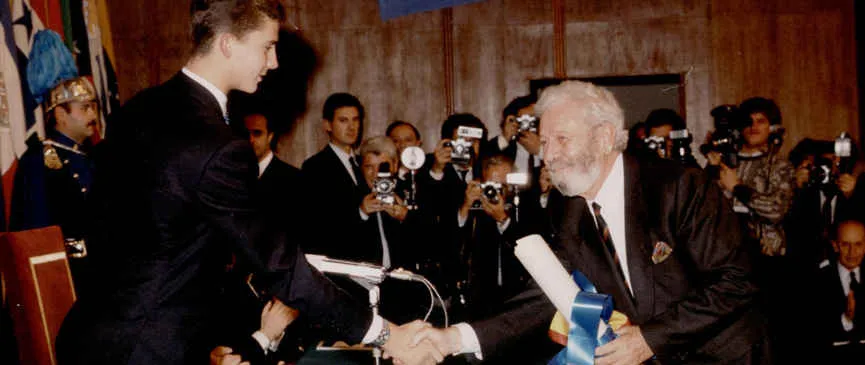Main content
Luis García Berlanga Prince of Asturias Award for the Arts 1986

The film-maker Luis García Berlanga (Valencia 1921 - Madrid 2010) began a degree in Philosophy and Arts at the University of Valencia, although he never finished it due to the Civil War. After a period dedicated to painting and after starting a cinema club in his hometown, in 1947 he entered the Institute of Film Research, the name then given to what is now the Official Film School. During this period he made some trial films, among which El Circo (1949) is worthy of note, as well as a number of documentaries. He also wrote several scripts, receiving in 1950 the first prize in the National Entertainment Union Competition for his script Familia provisional, written in cooperation with José Luis Colina.
Together with Juan Antonio Bardem, in 1951 he directed his first feature film, Esa pareja feliz. The following year, he alone directed Bienvenido Mr. Marshall, scripted by Bardem, one of the classics of Spanish cinema which was a prize-winner at the Cannes International Festival. The work of García Berlanga, then recognised internationally, continued with a series of box-office hits such as Novio a la vista (1954), Calabuch (1956) –which won the first prize of the OCIC at the Venice Film Festival– and Los jueves milagro. Berlanga started the following decade with Plácido (1961), which was nominated for the Oscar for best foreign language film. In 1963, he shot one of the episodes of the Franco-Italo-Spanish film Las cuatro verdades and El verdugo, another classic of his career, from a script written by himself and Rafael Azcona, which obtained the Critics’ Prize at the Venice Festival and the Grand Prix for Black Humour, awarded by the critics of Paris. In 1967 he directed La Boutique in Buenos Aires and, the following year, Vivan los novios. Tamaño natural, dating from 1972, is a study of human loneliness in which the main character lives with a blow-up doll with which he talks constantly. Due to censorship, it would not be shown in Spain until six years later. In 1978, he denounced the corruption of public powers with La escopeta nacional, and his next film, Patrimonio nacional, was chosen to represent Spain at the Oscar Academy Awards. This was followed by La Vaquilla, a comedy set in the Spain of the Civil War, which was well received by the public and critics alike, and Moros y cristianos (1987). Todos a la cárcel won three Goyas in 1993 for the best film, best director and best sound. In 1999, he presented his last film París-Tombuctú, which obtained the International Federation of Film Press (Fipresci) Award and recognition at the Mar de Plata International Film Festival. He also directed the “Sonrisa Vertical” collection of erotic literature.
Luis García Berlanga was the President of the National Film Library, Honorary President of the Spanish Film Academy, of which he was one of the creators, member of the Royal Academy of Fine Arts of San Fernando and was awarded honorary doctorates by the Complutense University of Madrid and Valencia Polytechnic. He received important awards and distinctions, among which are the National Film Prize (1980) and the Gold Medal for Fine Arts (1983), the Distinction of Cultural Merit from the Regional Government of Valencia (1993), the Special 2000 Critical Eye Award and the International Medal of Arts from the Community of Madrid (2003).
End of main content
